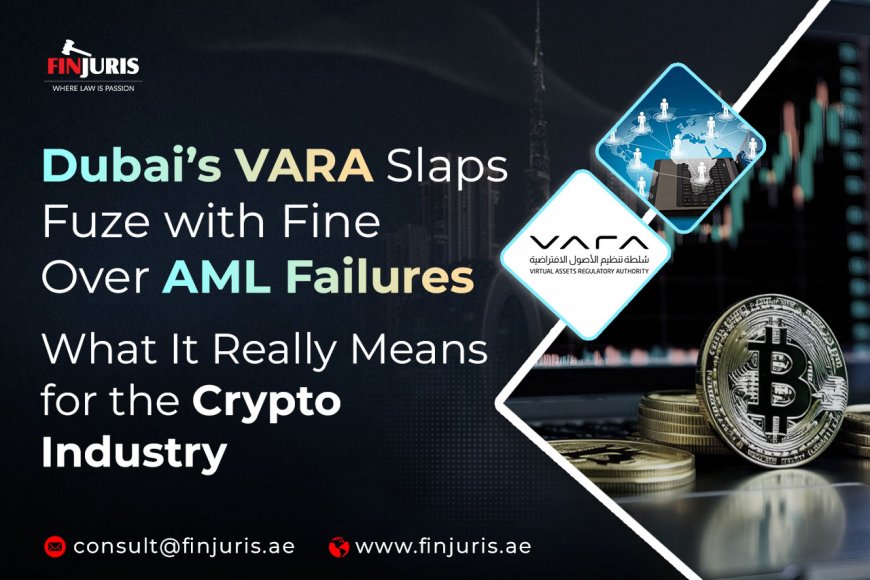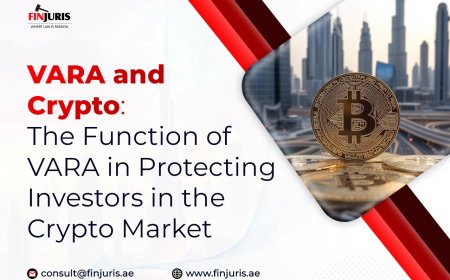Dubai’s VARA Slaps Fuze with Fine Over AML Failures- What It Really Means for the Crypto Industry
Dubai’s VARA fines Fuze for AML failures, signaling stricter crypto compliance rules and a clear warning for the global industry.

Dubai has worked tirelessly to brand itself as the global capital for digital assets. With its skyscrapers, futuristic city planning, and business-friendly environment, it isn’t surprising that crypto firms from around the world are setting up shop in the emirate. Yet, ambition comes with responsibility. If Dubai wants to be taken seriously as a financial hub, it cannot afford to let regulatory lapses slide.
Read More: VARA License Dubai: One of The Most Sought-After Licenses in Crypto Industry
That point was made crystal clear in August 2025, when the Virtual Assets Regulatory Authority (VARA) fined Fuze, one of the region’s most promising digital-asset infrastructure providers, over serious anti-money laundering (AML) failures.
Read More: What Is a VARA License? A Guide to Dubai’s Regulatory Gold Standard for Virtual Assets
The penalty against Fuze is more than just a fine; it’s a symbol of how Dubai plans to run its crypto ecosystem. To put it bluntly: this is not the Wild West of finance anymore. The rules are strict, the watchdogs are alert, and compliance is now the ticket to survival.
Who Is Fuze, and Why Does It Matter?
Fuze, officially known as Morpheus Software Technology FZE, is not a small player in the digital assets’ world. Backed by heavyweight investors such as ADQ’s Further Ventures, Galaxy, and e& Capital, Fuze has been one of the brightest rising stars in the Middle East’s crypto scene.
- In 2023, it raised a $14 million seed round.
- By May 2025, it closed a $12.2 million Series A, underscoring strong investor confidence.
- It boasts more than 500 institutional clients, including banks and fintechs, and has processed over $1 billion worth of transactions.
Fuze’s core business model is straightforward yet powerful: it provides “digital-assets-as-a-service infrastructure”, making it easier for traditional financial institutions to plug into the crypto economy. This places the company right at the intersection of traditional banking and blockchain technology, a space regulators watch closely.
So, when VARA’s probe revealed compliance lapses, it wasn’t just about one company breaking rules. It became a test case for how Dubai plans to uphold its reputation as a serious, globally credible crypto hub.
Read More: VARA and Crypto: The Function of VARA in Protecting Investors in the Crypto Market
VARA’s Investigation: What Went Wrong
The Timeline
- 19 October 2023: VARA grants Fuze its Virtual Asset Service Provider (VASP) license.
- 15 April 2025: VARA launches a formal investigation into the company’s activities.
- August 2025: Findings are published; Fuze is penalized and subjected to remediation measures.
Key Findings
The investigation exposed four core issues:
- Weak AML Program
Fuze’s systems for monitoring suspicious transactions were inadequate. AML failures are not a minor technical error, they are red flags in an industry already under global scrutiny for links to financial crime. - Governance Gaps
The company lacked robust compliance and risk-management structures. For a firm handling billions in digital transactions, governance cannot be an afterthought. - Unlicensed Activities
Fuze was found to have engaged in virtual asset services beyond the scope of its license, a direct violation of regulatory terms. - Lack of Transparency
Perhaps most damaging, Fuze failed to disclose material information that it was legally required to share with regulators. Trust, once broken, is hard to restore.
Read More: A Step-by-Step Guide on How to Obtain a VARA License in Dubai
The Penalties and Oversight
Unlike some jurisdictions where fines are announced and forgotten, VARA’s penalty comes with teeth.
- A financial fine was imposed (the exact figure remains undisclosed).
- VARA appointed a “Skilled Person” who is an independent compliance monitor, to oversee Fuze’s remediation process.
- The company is now under ongoing regulatory supervision, meaning every corrective step will be scrutinized.
This goes far beyond a slap on the wrist. VARA is essentially saying: “We’ll give you the chance to fix this, but we’ll be watching closely.”
Fuze’s Reaction: Damage Control and Rebuilding Trust
To its credit, Fuze did not deny the allegations. Instead, it acknowledged the shortcomings, emphasizing that the failures were tied to “historical transactions” rather than ongoing operations.
The company has since:
- Halted all non-compliant activities.
- Launched an internal review.
- Put in place a comprehensive remediation plan.
- Strengthened its executive team by appointing a Chief Compliance Officer, Head of Risk, and Head of Legal.
- Engaged external consultants to help align its governance with VARA’s requirements.
Importantly, Fuze assured clients and investors that its day-to-day services remain unaffected. That assurance was crucial; confidence is currency in the fintech and crypto industries.
Read More: Key Considerations While Applying for a VARA License Dubai
Why This Case Is Bigger Than Fuze
Protecting Dubai’s Reputation
Dubai is competing with hubs like Singapore, Hong Kong, and London to become the go-to jurisdiction for crypto businesses. Allowing a high-profile firm like Fuze to slip through the cracks would risk undermining years of reputation-building.
Message to the Industry
By penalizing Fuze, VARA sends a loud warning: no matter how big, well-funded, or promising a company is, compliance failures will have consequences.
Global Context
AML failures are a sensitive subject worldwide. From Binance’s record fines in the U.S. to European banks facing multi-billion-dollar penalties, regulators are increasingly intolerant of weak controls. VARA’s action aligns Dubai with global standards.
Read More: Charting the Course for a Cryptocurrency License – Global Trends and Legal Fundamentals
The UAE’s Larger Crackdown on Financial Crime
It’s not just VARA. Across the UAE, authorities are tightening their grip on AML compliance:
- In 2025 alone, UAE regulators imposed more than Dh339 million (~$92 million) in fines on banks and financial institutions for AML lapses.
- These moves are also part of efforts to satisfy the Financial Action Task Force (FATF), which has previously scrutinized the country for AML vulnerabilities.
For Dubai, showing the world it is serious about compliance isn’t just good governance, it’s an existential requirement for its financial hub ambitions.
What It Means for Other Crypto Firms
- No More Shortcuts
For years, the crypto industry in emerging hubs has enjoyed a degree of regulatory leniency. Startups could often get away with prioritizing product development, customer acquisition, and fundraising while leaving compliance frameworks to be dealt with later. That era is now firmly over in Dubai. By fining a well-capitalized and respected player like Fuze, VARA has made it clear that from the very first day a company operates under a license, it must demonstrate that its AML and governance systems are fully functional, not “works in progress.” This changes the calculus for new entrants: if you’re looking to launch in Dubai, you cannot think of compliance as a “Phase Two” project. It has to be baked into your foundation, just like your technology stack or your business plan.
- Transparency Is Non-Negotiable
Regulators everywhere understand that mistakes can happen, particularly in an industry as new and complex as crypto. What they do not tolerate is secrecy. Fuze’s failure to disclose material information was, in many ways, as damaging as its AML lapses. This sends a strong message: when in doubt, over-disclose. Regulators are far more likely to work with companies that are upfront about problems than with those that try to conceal them. For startups, this means adopting a cultural shift toward radical transparency. Every compliance issue, no matter how minor, should be documented, reported, and addressed. The cost of hiding information, both financially and reputationally is now far greater than the cost of admitting errors early.
- Investors Will Demand More
The consequences of VARA’s fine don’t stop at the regulatory level; they ripple into the investor ecosystem as well. Venture capital firms, sovereign wealth funds, and corporate investors that back crypto ventures in MENA will now demand much stronger compliance track records before committing capital. Institutional money is cautious by nature, and regulatory missteps represent both reputational and financial risks. Fuze’s case will serve as a reference point for term sheet negotiations in the years ahead. Investors may begin requiring compliance audits as part of due diligence, or insisting on board-level compliance committees as a condition of funding. For crypto startups, that means good governance will no longer just win you a license, it may be the deciding factor in whether or not you get funded.
- Self-Audits Will Become Routine
If there’s one practical takeaway for other firms, it’s that self-regulation is now essential. No company wants to be the next headline, and no regulator has the patience to supervise every internal process. The natural solution is for firms to adopt a system of routine self-audits. This means hiring third-party consultants to stress-test AML frameworks, simulate regulatory inspections, and identify weak points before VARA does. In fact, many firms may find that voluntary, proactive audits are not just best practice, they are a form of insurance against reputational damage. Companies that can show regulators they’re monitoring themselves diligently will always be better positioned to weather scrutiny.
- Ripple Effect Across the Region
Perhaps the most far-reaching implication of VARA’s action against Fuze is that it won’t remain confined to Dubai. Regulators across the Middle East and North Africa are watching closely. Many of these jurisdictions are still developing their own crypto frameworks, and they often look to Dubai as a model. By demonstrating that rules will be enforced even against high-profile players, VARA has effectively set a regional precedent. Neighboring regulators in Saudi Arabia, Bahrain, Qatar, and even Egypt, may now feel compelled to adopt similar enforcement strategies to avoid being seen as soft on compliance.
For crypto firms operating across multiple markets, this could mean a wave of harmonization in regulatory expectations. Where once companies might have tailored compliance standards to the most relaxed jurisdiction, they will now have to standardize upward—building systems that can withstand scrutiny everywhere, not just in one country. In the long run, this could actually benefit the industry by creating a level playing field and making cross-border operations smoother. But in the short term, it means significantly higher compliance costs for startups and established players alike. The message is clear: Dubai’s approach will not stop at its borders. The enforcement against Fuze is likely to echo across the entire region, reshaping how crypto businesses structure themselves for years to come.
Balancing Innovation and Oversight
Critics often argue that heavy-handed regulation stifles innovation. But Dubai seems intent on proving that innovation and regulation can coexist.
By enforcing strict rules while still welcoming ambitious firms, VARA is crafting a model where sustainable growth is built on trust and compliance.
The fine against Fuze may feel like a setback for the company, but for Dubai’s broader crypto ambitions, it might just be a necessary step in the maturation of its market.
The Road for Fuze and Dubai
For Fuze, the path forward will be challenging but not impossible. If it successfully implements VARA’s remediation requirements and rebuilds trust, it can still remain a central player in the region’s digital asset infrastructure.
For Dubai, this case will likely become a benchmark enforcement action, referenced for years whenever regulators or policymakers discuss how the emirate built a credible, globally respected digital assets regime.
The world will be watching to see whether Dubai can hold firms accountable while continuing to attract global crypto giants.
A Turning Point for MENA’s Crypto Industry
The fine against Fuze isn’t just about AML failures. It’s about Dubai declaring its seriousness in the global crypto race.
It’s a warning to other firms: the era of unchecked growth is over. It’s a lesson for investors: governance matters as much as growth. And it’s a sign for the global community: Dubai will play by international rules, not bend them.
In short, the case of Fuze is not just one company’s stumble. It is a turning point for how the Middle East approaches crypto regulation, one that will shape the industry’s future in the region for years to come.
What's Your Reaction?




















